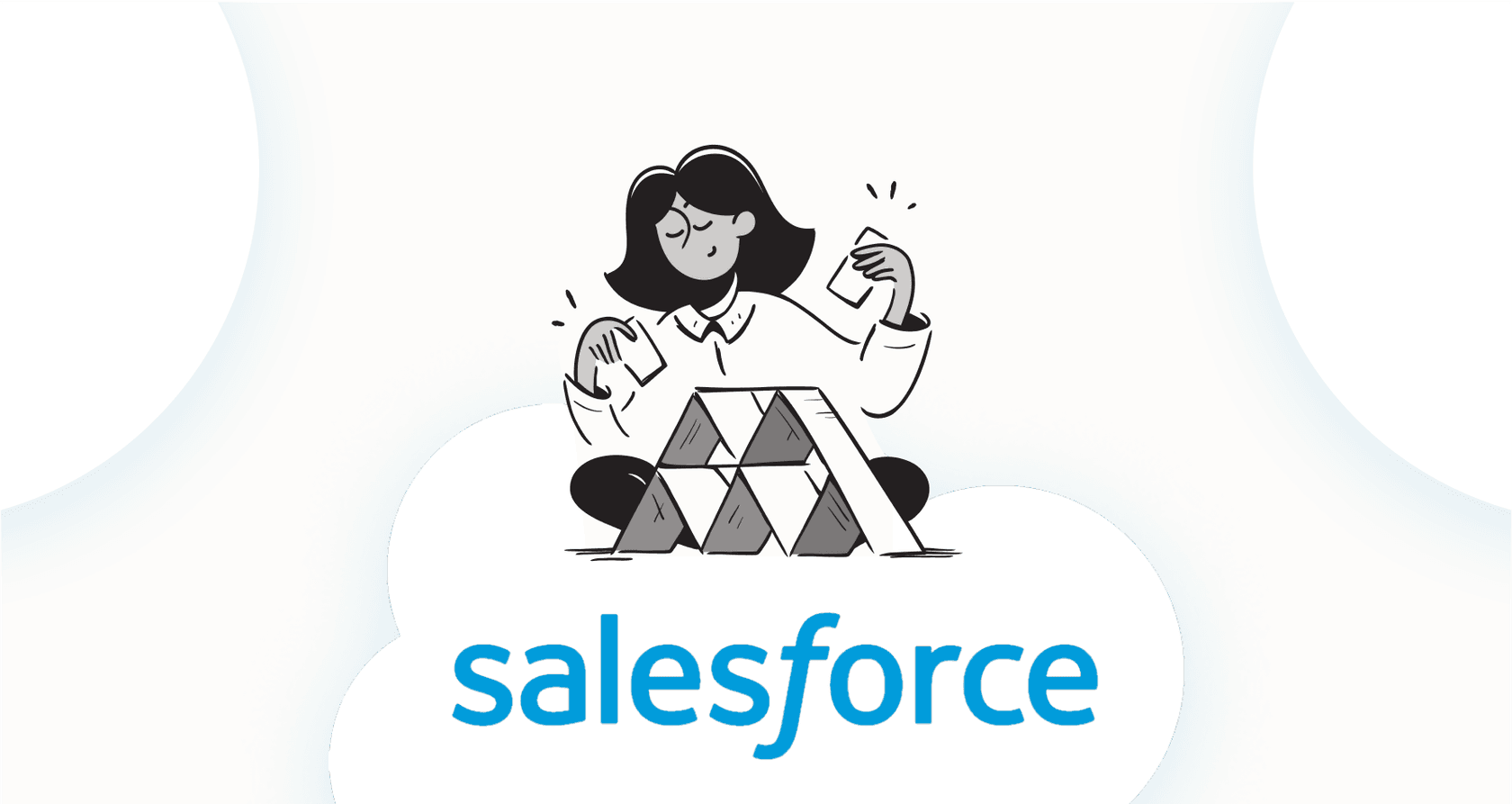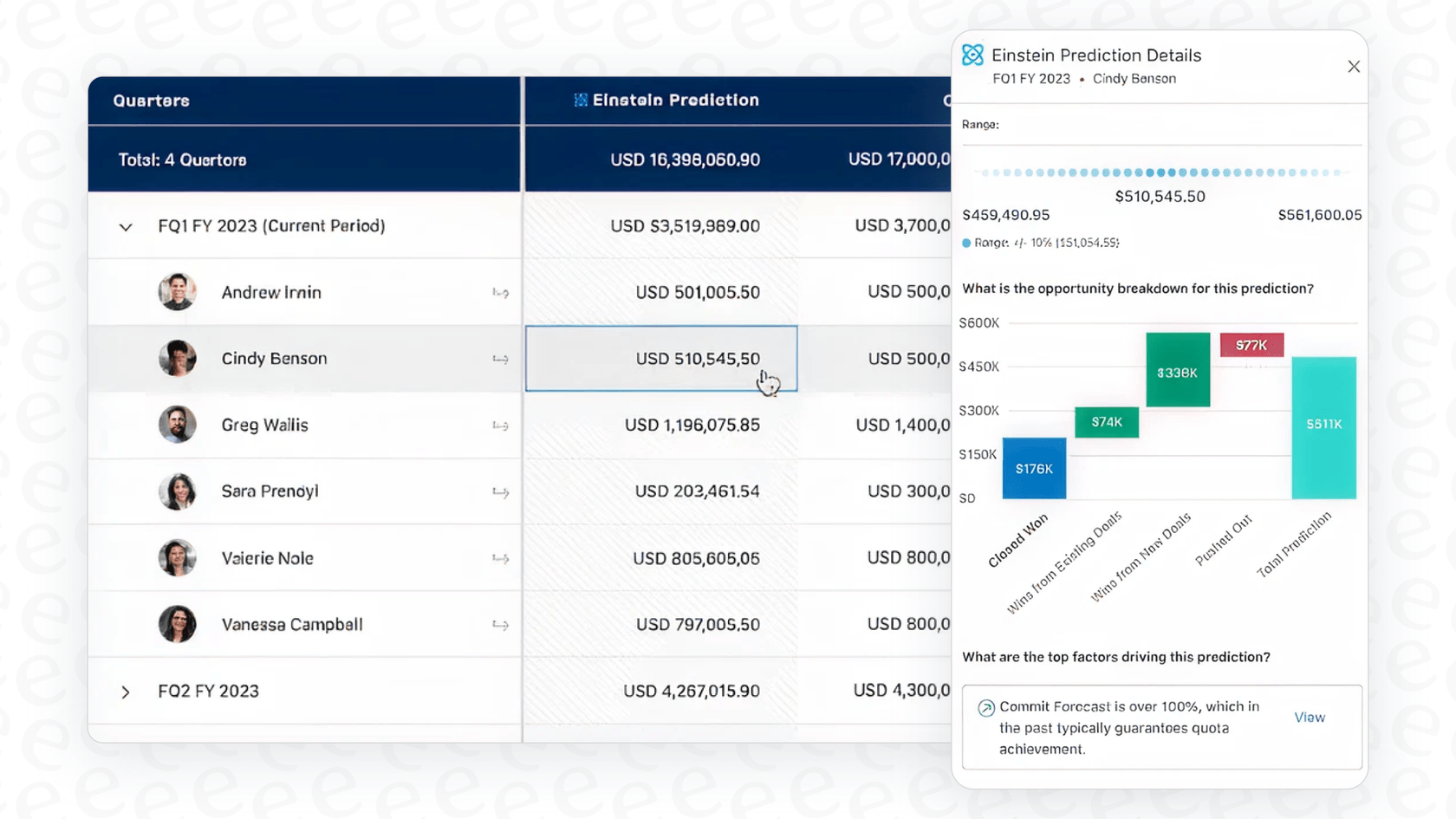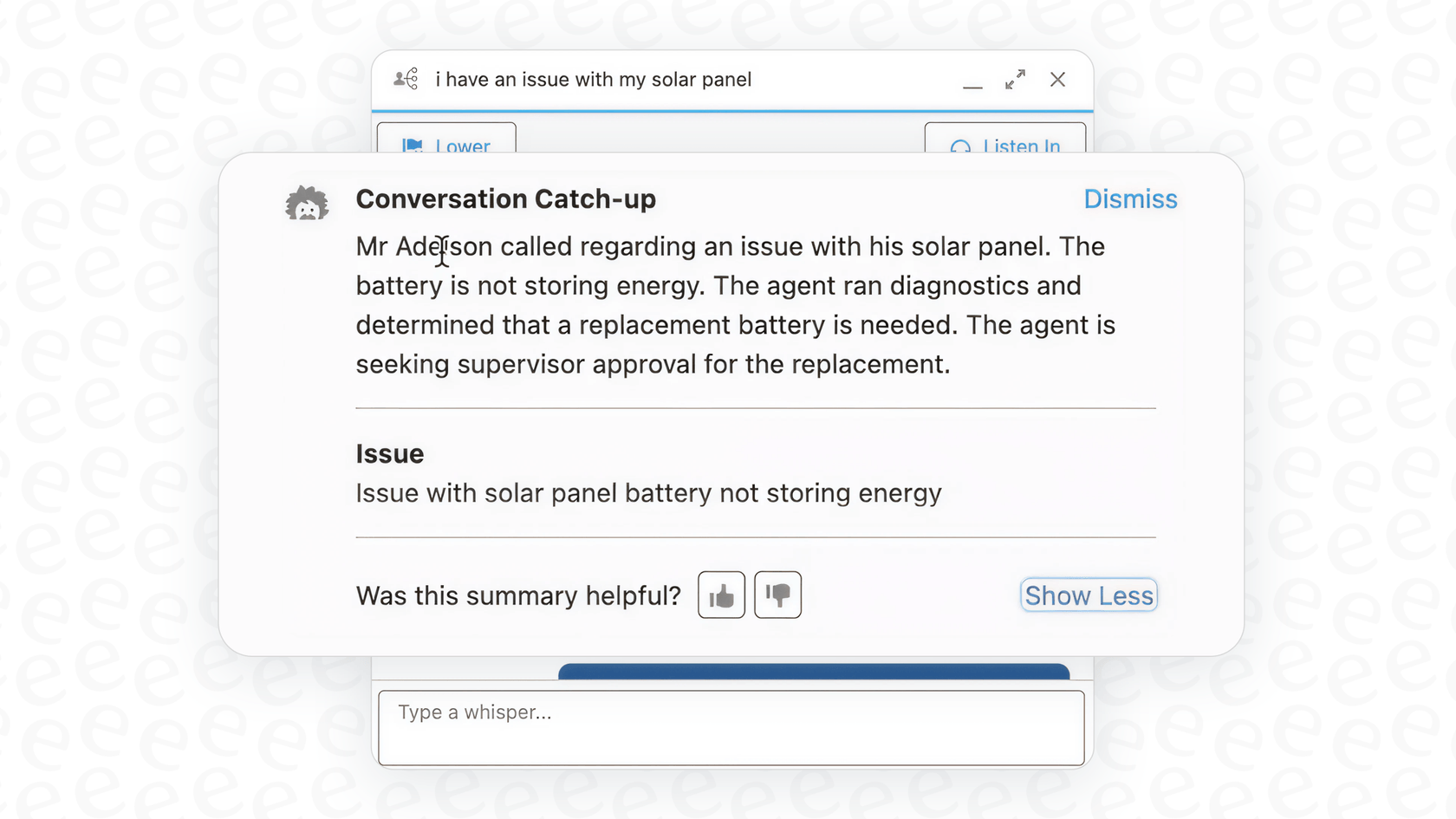
You’re using Salesforce to keep track of your customer relationships, but you have that nagging feeling there’s more gold hiding in your data. Salesforce AI Predictive Analytics promises to be the treasure map, helping your teams forecast revenue, pick out the best leads, and get a read on customer behavior before it even happens.
But getting there isn't as simple as flipping a switch. The reality often involves complicated setups, costs that seem to appear out of nowhere, and a learning curve so steep it leaves teams wondering if the whole thing was worth the effort.
This guide will walk you through what Salesforce AI Predictive Analytics actually is, what it takes to get it working, and where it falls short. We'll also look at a much more direct path to AI automation that you can get running in minutes, not months.
What is Salesforce AI Predictive Analytics?
So, what are we really talking about here? In a nutshell, Salesforce AI Predictive Analytics is a collection of tools, mostly powered by their Einstein AI, built right into the Salesforce platform. The goal is to comb through your past and present CRM data to make smart guesses about the future. Instead of just showing you a report on last quarter's numbers, it tries to tell you what's likely to happen next.
It uses machine learning to find patterns in data from all over your Salesforce org:
-
Old sales opportunities, both the wins and the losses.
-
Customer support case histories.
-
How customers engaged with your marketing campaigns.
-
General customer activity logs.
By spotting these patterns, Einstein can pop up with predictions, scores, and recommendations right where your team is working. For example, it might slap a "Lead Score" on new prospects to show your sales team who's hot and who's not, or flag a customer who seems likely to churn.

While it's often talked about as one big thing, it’s really a suite of different features spread across Sales Cloud, Service Cloud, and Marketing Cloud. That reach is part of its power, but it also makes things complicated, since each cloud has its own specific Einstein features and setup quirks.
Core features and common use cases
Salesforce’s predictive tools offer a few key features designed to make life easier for sales, service, and marketing folks. Here’s a rundown of the most common ones and what they do.
For sales: Lead and opportunity scoring
One of the most popular uses is figuring out which leads and deals are most likely to close. Einstein digs through your past data to learn what your successful deals have in common.
-
Einstein Lead Scoring: This tool looks at things like the lead source, industry, company size, and engagement to give each new lead a score. Your sales team can then use that number to focus on the people most likely to buy.
-
Opportunity Insights: This feature gives you real-time tips on active deals. It might point out that a key contact has gone silent or suggest a next step if a deal seems to be stuck in limbo.

For service: Case classification and routing
For customer service teams, predictive analytics can help get a handle on the flood of incoming support tickets.
-
Case Classification: Einstein can read the subject and description of a new case to automatically figure out what it's about (like a "Billing Question" or "Technical Problem") and set the right priority level, no human needed.
-
Case Routing: Once it's classified, Einstein can send the ticket straight to the agent or team best equipped to handle it. This can cut down on wait times and hopefully lead to happier customers.

For forecasting: Predicting revenue
This is a step up from just looking at your pipeline and hoping for the best. Einstein looks at your team's past performance and the current state of your deals to generate a more accurate revenue forecast. It can spot deals that are likely to slip into next quarter and adjust the numbers, giving sales leaders a more grounded view of what to expect.
These features all sound great, but they share one critical dependency: they need a ton of clean, historical data to work properly. And for many teams, that’s where the trouble begins.
The hidden challenges of implementing Salesforce AI Predictive Analytics
While the promise of AI is exciting, the reality of getting it running in Salesforce can be a slow and expensive grind. Plenty of companies buy the licenses only to find the tools gathering dust because they completely underestimated what it takes to get started.
1. The data readiness problem
An AI model is only as good as the data it learns from. To get anything useful out of Einstein, you need years of clean, consistent, and well-organized data. The problem is, most companies have data that is:
-
Siloed: Spread out across different systems, not just neatly tucked into Salesforce.
-
Inconsistent: Full of duplicates, empty fields, and information that's just plain wrong.
-
Insufficient: Simply not enough history for the AI to learn any meaningful patterns.
Just cleaning up this data mess is a huge project in itself. It can take a team of specialists months of work before you can even think about turning on the AI.
2. Lengthy and complex setup
Unlike some of the newer AI tools out there, setting up Salesforce Einstein isn't something you knock out on a Tuesday afternoon. The process usually looks something like this:
-
Figure out exactly what you want to predict.
-
Use Salesforce’s tools to build and train the AI model on your data.
-
Test the model to see if its predictions are any good, then tweak it and test again.
-
Train your team on how to actually use and trust the AI's recommendations.
This whole cycle can easily stretch over several months and often requires pricey Salesforce consultants to get it right, which just adds to the bill.
graph TD A[Define Prediction Goal] --> B{Gather & Clean Data}; B --> C[Build & Train Model in Salesforce]; C --> D{Test & Validate Predictions}; D -- Predictions Inaccurate --> C; D -- Predictions Accurate --> E[Deploy Model]; E --> F[Train Team on New Insights]; G((Months Later)) F --> G;
3. The rigid "black box" approach
Once a model is up and running, it can be tough for your team to understand why it's making certain predictions. This "black box" feeling can make people hesitant to trust it, and if they don't trust it, they won't use it. If your business changes or you need to adapt the model, you’re often back to square one with that long, complicated setup process.
For teams that need to be agile, this is a serious bottleneck. In contrast, modern platforms like eesel AI are built to be more transparent and flexible. You can go live in minutes by connecting your existing helpdesk and knowledge sources. Its fully customizable workflow engine gives you total control over how the AI behaves, no data science degree required. You can even simulate how it would have performed on past tickets before you activate anything, so you can roll it out with confidence.

Salesforce AI Predictive Analytics: Pricing explained
Trying to figure out what Salesforce AI Predictive Analytics will actually cost you can feel like a bit of a mystery. The pricing isn't listed in a simple, public way and usually involves a mix of platform add-ons and per-user fees that can add up fast.
Here’s a rough idea of what you might be looking at:
-
Sales Cloud Einstein: This is typically an add-on for the higher-tier Sales Cloud editions. Sources suggest it can run around $50 per user, per month, but that's with an annual contract.
-
Service Cloud Einstein: Similar to the sales version, this is an add-on for Service Cloud with features like Case Classification.
-
CRM Analytics: If you need more advanced predictive tools, you'll likely need CRM Analytics (what used to be called Einstein Analytics). This comes with its own licensing costs that can easily hit tens of thousands of dollars a year.
-
Implementation Costs: On top of the licenses, you have to budget for the actual implementation. This can range anywhere from $10,000 to over $100,000, depending on how complex your project is and whether you hire outside help.
The main takeaway here is that Salesforce’s AI pricing is complicated, not very transparent, and designed for big, long-term enterprise deals. This is a world away from solutions built for clarity and speed.
For example, eesel AI has transparent and predictable pricing with simple tiers based on what you use, not how many people are on your team. There are no per-resolution fees, so your costs won't suddenly jump in a busy month. You can even start with a month-to-month plan and cancel anytime, which gives you a level of flexibility that’s pretty rare in this space.
| Feature | Salesforce Einstein | eesel AI |
|---|---|---|
| Pricing Model | Opaque, add-ons, per-user fees | Transparent tiers, usage-based |
| Hidden Fees | Common (implementation, consulting) | None, no per-resolution fees |
| Contract Terms | Typically annual or multi-year | Monthly and annual options |
| Setup Cost | Often requires expensive consultants | Radically self-serve, go live in minutes |
Beyond Salesforce AI Predictive Analytics: A faster path to support automation
Look, Salesforce AI Predictive Analytics is a powerful set of tools. For massive companies with perfect data and very deep pockets, it can absolutely provide insights that shape big-picture strategy.
But for most businesses, especially those that need to move fast, the road to getting value from Salesforce AI is long, complicated, and expensive. The need for perfect data, the months-long setup, and the rigid nature of the platform make it a pretty tough first step into AI.
The good news is, there's a better way to get started. Modern AI platforms are built for speed, transparency, and immediate results. Instead of spending a year overhauling your data, you can use a tool that works with the knowledge you already have.
eesel AI plugs directly into your existing helpdesk and knowledge sources, like past tickets, Confluence, and Google Docs, to provide autonomous support from day one. It's a truly self-serve setup, so you can launch your first AI agent in minutes and use a powerful simulation engine to test and fine-tune its performance with zero risk. If you’re looking for AI that delivers results now, not next year, it’s time to explore a solution built for the speed of modern business.
Frequently asked questions
Salesforce AI Predictive Analytics is a suite of AI-powered tools, primarily Einstein, integrated into the Salesforce platform. It analyzes historical and current CRM data to identify patterns and make predictions about future outcomes, such as lead conversion or customer churn.
For sales, it provides Einstein Lead Scoring and Opportunity Insights to prioritize leads and guide deals. In service, it enables Case Classification and Routing to efficiently manage support tickets. It also assists with more accurate revenue forecasting for sales leaders.
Key challenges include the extensive need for clean, consistent historical data, which many companies lack. The setup process is also lengthy and complex, often requiring months and external consultants, and its "black box" nature can make predictions hard to trust.
Data readiness is extremely critical. Salesforce AI Predictive Analytics models rely on years of clean, consistent, and well-organized data to learn meaningful patterns. Insufficient or messy data can render the AI ineffective and lead to a significant cleanup project before deployment.
Pricing is often opaque, involving add-ons for higher-tier Sales/Service Cloud editions and per-user fees, with CRM Analytics adding further costs. Significant hidden costs include implementation fees, which can range from $10,000 to over $100,000, and ongoing consulting expenses.
Yes, modern AI platforms like eesel AI offer a faster path to automation. They are designed for quick setup, transparent pricing, and can integrate with existing knowledge sources in minutes, providing greater flexibility and immediate results compared to the complex Salesforce approach.
Share this post

Article by
Stevia Putri
Stevia Putri is a marketing generalist at eesel AI, where she helps turn powerful AI tools into stories that resonate. She’s driven by curiosity, clarity, and the human side of technology.







